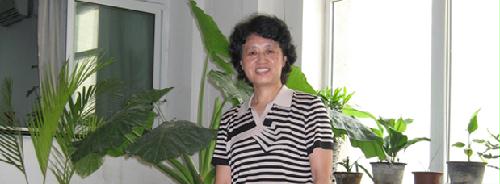
Jing-rong Cui, Born in April. 26, 1952, in Beijing, China; 1973.9-1976.12: School of Basic Medical Sciences, Beijing Medical College (Peking University Health Science Center); 1977 – Present: to a post of Teaching Assistant、 Lecturer 、Associate Professor and Professor at Department of Pharmacology,School of Pharmaceutical Sciences, Peking University Health Science Center; 1992-1993: engaged in research on the Molecular Pharmacology and Molecular Toxicology at free University, the Holland; At present: to appoint director of Pharmacology group of National research Laboratory of Natural and Biomimetic Drugs and head of Department of Molecular and Cellular Pharmacology. Committee member of Association of China Anticancer and Anticancer Drugs.Undertook research item for 10 topic such as: the 8th 、9th and 10th “Five economic development plan” 、”973” item of national、nature science fund of national …… . Significant Published research papers for more 90 piece, which there are 45 SCI papers, and had apply patents of China、 America and world for 10 item.
Research Interests:
At present, the main research antitumor drugs in screening、pharmacodynamics、action mechanisms The national screening laboratory will follow research development in mechanisms of tumor occur, and to establishing new method and model, such as: Key enzyme of Signal transduction、induce cell apoptosis and differentiation、oncogene and tumor suppressor gene、microtubule protein、anti-tumor metastasis、cancer protection、et al, and to screening for discovering lead compounds and new drugs.
Selected Publications:
1. Cui jingrong, Hui Yu,Xiang You-qing and Zhang Lihe. Effect of 8-Chloroadenosine on undifferetiatied HL-60 cell line.Journal of Chinese Phamaceutical Sciences 2003,12(4):215-221.
2. S.-Y. Wei, M. Li, S. A. Tang, W. Sun, B. Xu, J.- R. Cui*, W.- H. Lin, Induction of apoptosis accompanying with G1 phase arrest and microtubule disassembly in human hepatoma cells by jaspolide B, a new isomalabaricane-type triterpene, Cancer Lett., 2008, 262: 114-122.
3. C. Tang, Zh.-L. Zhang, B. Xu, M. Li, J.-Y. Liu, J.-R.Cui* Two newly synthesized 5-methyltetrahydrofolate-like compounds inhibit methionine synthase activity accompanied by cell cycle arrest in G1/S phase and apoptosis in vitro. Anti-cancer Drugs 2008, 19: 697-704
4. L.-P. Pang, W. Huang, Q. Sunc, W. Guoa, R.-T. Li, J.-R. Cui*, SLXM-2, a derivative of cyclophosphamide: mechanism of growth inhibition on hepatocarcinoma 22 cells, Anti-Cancer Drugs, 2008, 19: 167-174.
5. N. Zhang, G. Wei, L. Wang, W. Wang, B. Xu, Z.-M.Ge, M. Li, R. Tao, J.-R. Cui*, Effect of TM208 on QGY-7703 xenograft tumor growth, Anti-Cancer Drugs, 2008, 19(6):593-598.
6. M. Li, S.-Y. Wei, B. Xu, W. Guo, D.-L. Liu, J.-R. Cui*, X. Sheng, YAOPro-apoptotic and microtubule-disassembly effects of ardisiacrispin (A+B) from Ardisia crenata on human hepatoma Bel-7402 cells, J. Asian Nat. Prod. Res., 2008, 19 (7): 256-262.
7. X.-H. Wang, B. Xu, J.–T. Liu, J.-R. Cui*, Effect of β-escin sodium on endothelial cells proliferation,migration and apoptosis. Vascular Pharmacology , 2008, 49:158-165.
8. H.-Y. Yang, W. Guo, B. Xu, M. Li, J.-R. Cui, Anticancer activity and mechanisms of norcantharidin-Nd3II on hepatoma, Anti-Cancer Drugs ,2007, 18:1133-1137.
9. Y.-X. Ma, H.-Z. Fu, M. Li, W. Sun, B. Xu, J.-R. Cui*, An anticancer effect of a new saponin component from Gymnocladus chinensis Baillon through inactivation of NF-KB, Anticancer Drugs, 2007 18. (1): 41-46.
10. Q. Sun, R.-T. Li, W. Guo, J.-R. Cui*, Tie-Ming Cheng and Ze Mei Ge, Novel call of cyclophosphaminde Prodrug:cyclophosphamide spiropiperaziniums(CPSP), Bioorganic Medicinal Chemistry Letters, 2006,16:3727-3730.
